The Fate of BRIN under Prabowo’s Administration
The position of BRIN remains uncertain under Prabowo Subianto’s administration. The restructuring of the research agency is hampered by political interests.
maaf email atau password anda salah
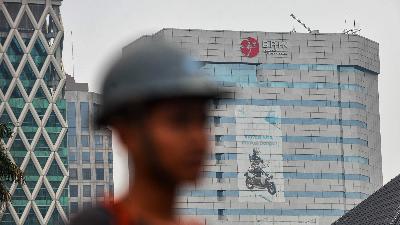
The position of BRIN remains uncertain under Prabowo Subianto’s administration. The restructuring of the research agency is hampered by political interests.
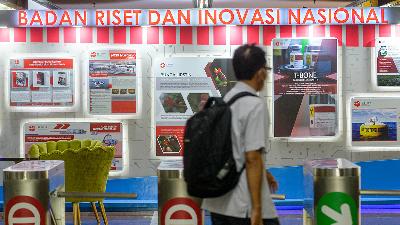
BRIN Chair cuts the performance allowances of 121 authors of an article published in an international journal. It is not clear what the authors’ violation is.

The merger of all research institutes into the National Research and Innovation Agency (BRIN) has a political motive. It is not in compliance with the law.

After three years at the helm of the Indonesian Institute of Sciences (LIPI), Laksana Tri Handoko is entrusted with a new job: to lead the National Research and Innovation Agency (BRIN). The Japan-educated scientist is given a mandate by President Joko Widodo to integrate five major national research institutes. He is tasked to catch up lags in science and technology, to create technological independence and to focus on exploring the digital economy as well as green and blue economy. He would also continue his efforts which he initiated in LIPI to bring back a diaspora of Indonesian researchers to strengthen BRIN. Handoko said BRIN also needed political support to realize research as one of the main pillars of the national economy.

The Tempo magazine wrote about the land transfer of Radio Republik Indonesia (RRI) to the religious affairs ministry in its June 30-July 6, 2020 edition in an article titled Up in the Air for RRI. I would like to comment on this report.

Construction of the Indonesian International Islamic University on land formerly owned by RRI has a number of issues. Several of RRI assets have disappeared. Neither has it obtained a subsitute location. The land transfer occurred after the intervention of then Vice President, Muhammad Jusuf Kalla.
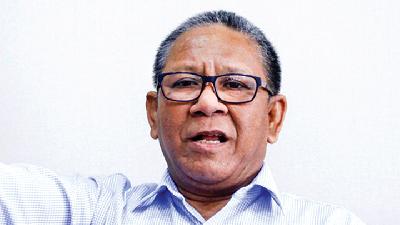
Mohammad Rohanudin, CEO of Radio Republik Indonesia (RRI), had fought to keep a 142.5- hectares land that was going to be taken away to be used as the location for the Indonesian International Islamic University (UIII).

ON November 12, 2019 at 10:08pm, West Indonesia Time, I received an SMS notification from BRI that I had made four banking transactions with a nominal value of Rp2.5 million per transaction plus a Rp7,500 administration fee.

Kucumbu Tubuh Indahku explores masculine and feminine subjects within a single body. It is the peak of Garin Nugroho’s maturity as a film director.

The 35,000-megawatt electricity program will almost certainly miss its deadline due to a lack of funding and poor planning.

After he was reported to the police by a number of groups, Rizieq Syihab vented out his disappointment to the House of Representatives (DPR). In a hearing with the Legal Affairs Commission last week, Rizieq suspected that the reports to the police were being intentionally arranged behind the scenes. "This is an unhealthy way of law enforcement," Rizieq to Tempo and some reporters at the DPR Complex in Senayan, Jakarta.
What will you do about these reports to the police?

Model Mariana Renata lives a fast-paced life in New York City, gracing the covers of several well-known fashion magazines likeCosmopolitan and Harper's Bazaar.

HAVING led an automative company during the political and economic turbulence of 1998 to 2000, Rini Mariani Soemarno, 56, is no stranger to crises. She reckons that particular experience will serve her well in her new job as chief of staff of the Joko Widodo-Jusuf Kalla Transition Team. Formed by the president-elect himself, the team is tasked with preparing everything, including the inauguration ceremony scheduled for October 20.
Yet Rini's appointment has raised suspicions and worries among certain groups, the main reason being the close relationship between this former trade and industry minister (2001-2004) with Megawati Soekarnoputri, chair of the Indonesian Democratic Party of Struggle (PDI-P). It is no secret that during the recent presidential campaign, Jokowi was criticized as a 'puppet' of Megawati, part of the smear campaign against him.

Two young brothers, graduates of a technical high school in Salatiga, Central Java, beat out full-fledged engineers from Oxford University in the UK, to win the recent General Electric's 3D Printing Challenge contest. "Arfi'an Fuadi and M.Arie Kurniawan succeeded in designing a jet engine bracket-a component to raise aircraft engines-weighing much less than what has been designed," said Handry Satriago, CEO of General Electric Indonesia at an event honoring the winners on July 22.

In April, singer Iis Dahlia made her second umrah (minor) pilgrimage to Mecca. "I did nothing but concentrate on observing ibadah (religious worship) duties, something I find difficult to do at home," Iis said. "The umrah is when you recharge your life's batteries."
Iis' focus on ibadah meant she generally refrained from posing for photos with her fellow pilgrims. "It was all right. I did join only when we came across an interesting site during the pilgrimage," she said. "Now there is a low-cost umrah package as the alternative to an ordinary tour."

OF the 38 survey and quick count pollsters registered with the General Elections Commission (KPU) ahead of the recent presidential election, Radio Republic Indonesia Public Broadcast Board (LPP RRI) Research and Educational Development and Training Center is one that has come under intense scrutiny. RRI's quick count on the day of the election, July 9, showed that Joko Widodo-Jusuf Kalla had received 52.21 percent of the vote, while the ticket's only opponents, Prabowo Subianto-Hatta Rajasa, had taken 47.49 percent.
Ramadhan Pohan, deputy chairman of House of Representatives' (DPR) Commission I, which oversees defense, foreign affairs and communication, believes RRI should not broadcast quick count results. "RRI's funding is a source of suspicion because it comes from the State Budget (APBN)," he said.

ROSARITA Niken Widiastuti did not immediately start speaking. She kept squeezing the tissue paper in her hand, as if plucking up the courage to open the conversation. "Look, let's not discuss threats," said Niken, the executive director of state-owned Radio Republik Indonesia (RRI) broadcasting station. She was on her way to Aceh, to close the Qur'an Reading Contest, along with Minister of Administrative Reform Azwar Abubakar and Aceh Governor Zaini Abdullah. "This is an annual affair of RRI," explained Niken.
She is very aware that her agency is under the public spotlight. RRI's quick count of the recent presidential polls seems to have triggered sharp debate. She now faces the prospect of being summoned by the House of Representatives' (DPR) Commission on Information, whose chairman, Mahfudz Siddiq, maintains that RRI's quick count was not part of its mandate.

As the corporate head of a province-owned company supplying drinking water to Jakarta's millions of people, Sriwidayanto is in a big mess. He is constantly on the receiving end of public criticism over the poor quality of the service and the high cost of the water.
But Sriwidayanto remains unruffled. He claims there is nothing he can do when it involves the basic agreement of cooperation signed between the Jakarta Raya Drinking Water Company (PAM Jaya) and two foreign concerns which have been their partners since 1998: PAM Lyonnaisse Jaya (Palyja) and Aetra Air Jakarta (Aetra). "That agreement has been a mess since day one," he said openly.

The peace talks between Israel and Palestine became uncertain when violence escalated with the deaths of three Israelis and a Palestinian last week. Palestine's ambassador to Indonesia, Fariz Mehdawi, said his people were still waiting for a peace negotiation, and a two-state solution would have Israel and Palestine coexist peacefully as free countries. However, Mehdawi reminded that if the atrocities continued to occur, Palestinians would retaliate and the situation would spiral even further out of control. Tempo journalists Natalia Santi, Rosalina and Atmi Pertiwi interviewed Meh-dawi in his office in Jakarta on Monday last week.
What are the prospects of Israel-Palestine peace talks amid the ongoing violence?

The Kalumpang site in West Sulawesi has been around for the past six decades. In 1951, Dutch archeologist, Pieter Vincent van Stein-Callenfels first presented the results of his research at the East Asia Prehistoric Congress in Manila, the Philippines. He had been studying the banks of the Karama River since 1933.
Indonesian researchers only started work there in 1969. Since then, there was no intensive research for a few decades until 2004, when a team from the National Archeological Center went to Kalumpang to carry out a four-year research.

For more than 20 years, Udin Hasanudin, a lecturer at the Lampung Agricultural Products University, studied the process of converting waste into energy. When renewable energy was not yet popular, he had already invented a machine which could turn tapioca waste into biogas. "When I offered my findings to the tapioca center at Pesawaran, Lampung in 1993, they rejected it," said 50-year-old Udin. At that time, fuel oil was still cheap. "They didn't want the hassle," Udin said.
He resumed his research on tapioca in 2005, after getting his doctorate degree from Toyohasi University of Energy in Japan. This time, Udin received funding from the New Energy Industrial Organization (NEDO), an agency under the Japanese Trade and Industrial Energy Ministry. Udin collaborated with the Indonesian Energy and Mineral Resources Ministry on the project so the research could be applied in Indonesia. His findings are now being used at the tapioca processing at Pesawaran.

The Supreme Audit Board (BPK) is reported to have manipulated the audit opinion on its performance and financial report. The alleged opinion of 'trading' emerged prior to the selection of the new BPK chairman last April. Rizal Djalil was chosen to replace Hadi Poernomo who will retire following the end of his term on October.
Rizal denied he was involved in the illegal 'buying and selling' of audit opinions. He said the auditors under his jurisdiction were miserly in giving their 'unqualified (Wajar tanpa Pengecualian-WTP)' audit opinion. "Just look at other places," said Rizal, a former National Mandate Party (PAN) politician.

After seven years of deliberation, the House of Representatives (DPR) passed Law No. 6/2014 on Village Administration, in December last year. The regulations contained in it are seen as revolutionary, because it changed the paradigm of how people viewed a village. "All this time, villages have been under the authority of the regency or the province. This new law is intended to make villages the object (of development programs)," said Arie Sudjito, 42, lecturer of sociology at Gadjah Mada University in Yogyakarta. For four years, Arie coordinated the team advocating for the legislation.
The Village Law requires the central government to allocate 10 percent of the State Budget for village development. This translates into Rp900 million to Rp1.2 billion per village-channeled directly to the villages-giving local leaders access to resources with which to carry out innovative programs.

FOR one year and four months, my husband, Lodowik Djami, a member of the Mawali Sumba Christian Church (GKS) council, was imprisoned inside the Waikabubak Prison in West Sumba regency, East Nusa Tenggara province.
I still remember quite well the moments when my husband was arrested in this house on January 18, 1966 around 10.00 o'clock a.m. I was then 32 years old. I knew well the personnel who took my husband away. They were civil servants and my husband's colleagues at the Office of Agriculture. These people searched the every nook and corner of my house and took my husband to be questioned.

JUST when he thought he had reached retirement age from his job as a diplomat, Makarim Wibisono was given a new task by the United Nations Human Rights Council (UNHRC). It asked him to be a special rapporteur on human rights issues in Palestine. He is the first Indonesian diplomat to be given that mandate.
Makarim is no stranger to challenging missions. He was chairman of the UN Human Rights Commission, before it became a council in 2007. His predecessor as special rapporteur for Palestine is Richard Falk from the United States, who resigned six years after he took up the assignment.

Active in fighting graft and upholding human rights, Taufik Basari is determined to remain outspoken if elected to the House of Representatives (DPR). His assets in seeking a seat in the national legislature mostly comprise a network of activists and friends.

Having spent half her life defending human rights, she has entered the political stage, inspired by Joko Widodo.

Successful in leading Payakumbuh city for two terms, Josrizal Zain is now exploring the national political stage. But he would resign rather than compromise his principles.

Televisi Republik Indonesia (TVRI) is in total confusion. Without managers or a board of directors, the state-owned public broadcasting station is like a ship without a captain. Tempo discovered how the conflicts and indications of corruption which have ravaged TVRI are connected with the exploits of some people close to DPR Speaker Marzuki Alie.

The managers of TVRI are in a big mess. No one seems to be in charge of the state-owned public broadcaster. This might be a good opportunity to restructure and make something good out of a bad situation.

TVRI employees have engaged in a free-for-all of selling the company's airtime under the table and pocketing the money themselves. That is just one of the ways they siphon off the company's funds.

Mario Viegas Carrascalao, 76 has been around since Timor-Leste was Portuguese. He was among the first 10 East Timorese to graduate from university during the 400 years of its colonization. In those days, he served as head of the Office of Agriculture and Forestry, then became a major player when the region was under Indonesian control from 1976 to 1999. After the referendum for Timor-Leste independence in 1999, Mario returned to his homeland, going on to become a member of its parliament and vice prime minister.

Located between the mountains of Rinjani and Sankareang, the Torean trail offers panoramic variety. First, the climber goes though thick forest, dense brush, down a valley, through undulating rivers, waterfalls and a few hot water holes, flowing down onto a cave. This trail is a harder but far interesting route towards Mount Rinjani than the better known Senaru and Sembalun.

By the Bahau River, life stands still, untouched by loggers, miners or oil palm planters. As we rested by the banks of the river, grilling freshly caught fish, butterflies perched on our arms, our headsunafraid. When the breeze blew our way, the leaves on the trees whispered its lament, some fell on the ground, like confetti at a celebration.

A semi-autobiographical film by Cambodian director Rithy Panh won the Un Certain Regard award. It is an effort to keep memories alive.

Ever since high school, Saniah had always wanted to be a journalist. I want to see changes," said the 39-year-old activist, who was born and raised in the once strife-torn, resource-rich province of Aceh. She is one of nine siblings whose mother continues to push her cart daily, peddling fresh cuts of beef around her village, just outside of Lhokseumawe town. Lacking funds to go to university, Sania went to neighboring Malaysia as a migrant worker at 18, returning six years later to enroll for journalism classes, earning a degree in 2005. She plunged enthusiastically into a career mired in political challenges and full of social taboos, in Sharia-based Aceh.

It took 40 years to convince doctors and the public that not all diarrhea is caused by bacteria.

The DPR has begun discussion of the National Security Bill. The definitions of its articles are neither strict nor clear. There are fears they could become ‘rubbery.’

Plant pests are wreaking havoc on rice farms in East and Central Java, leading to a fall in rice production in the two provinces.

Rupert Murdoch shut down his News of the World weekly, which used phone-hacking to break a number of exclusive news stories. Is this the end of the Murdoch media empire?

A Judicial Commission team concludes there was a violation in the court trial of Antasari Azhar. But it is not accepted as new evidence for a review.

Terrorists targeted and shot police in Palu. Did their weapons actually originate from the police?

A former South Nias regent is caught up in a bribery case. The Democrats had fought for his reelection.

Long ignored, the massive mural by the late artist Harijadi Sumadidjaja at Fatahillah Museum, Jakarta, is now open to the public. Painted on 200 square meters of walls, the mural illustrates the details of daily life in Batavia. From a wedding party, slaves playing music, to a pickpocket in the market.

A teenager in Klaten is charged with acts of terrorism. Due to his age his trial is being held behind closed doors.

The Constitutional Court repeals an old law on parliament’s investigative right.

Gayus’s trips are suspected of being attempts at saving the money he had amassed from taxpayers’ bribes. Some of the money was deposited with the UOB bank in Singapore. The Financial Transactions Reporting and Analysis Center is now seeking information from the countries Gayus visited on any of the accounts he may have in those places.

Fitri produced choreographies that are out of the ordinary and often surprising.

Krisna Murti is a video artist who is both capable and consistent in discovering the essence of video art.

The price of rice is expected to fall as the government is set to relax rice regulations.

The TVRI Supervisory Board resigns en masse. They are regarded as interfering with operational affairs.

Deposits worth Rp1.3 trillion in a Swiss bank, belonging to the old Bank Century owners and which should have been confiscated by the state, are in danger of not being recovered. Bank Century’s new management is accused of negligence. Even the government does not seem serious about this.

The increase in the basic electricity rates has led entrepreneurs to lodge protests. Upper and lower tariff limitations for industrial customers will also be applied

Tough rules connected with the World Cup were announced by Electronic City, the holder of the broadcasting right in Indonesia. Sports journalists protested.

A jailed terrorist released last year from jail is on the run again.

The government is preparing a process to resolve missing person’s cases and other human rights violations through a public apology.

The newly formed Coalition Joint Secretariat is believed to be an effort by Yudhoyono to tame the DPR. It will also take part in selecting officials.

Anggodo Widjojo went to trial for the first time. However, Ary Muladi who allegedly bribed the leaders of the KPK together with Anggodo was not named as a suspect.

Six suspected terrorists were arrested in Medan. Some of them planned to bomb President Yudhoyono.

A judge and a lawyer are caught in the act of bribery over a case of land ownership. The lawyer insists it is money for land purchase.

Prisons are a fertile breeding ground for terrorist recruitment. Terrorist convicts preach via cellphones.

The KPK offers two legal options for former TNI/Police faction members implicated in the travelers check case: the military court or a joint trial.

The Energy Commission accused PLN of raising electricity prices-on the quiet. The policy for new electricity tariffs is still being carried out.

The furor over Ayin’s luxurious prison cell led to the removal of the Pondok Bambu prison warden. The government is setting aside Rp1 trillion to upgrade the country’s jails.

The Parliamentary Committee of inquiry into Bank Century has been looking into the change of regulations concerning the provision of short-term funding facilities to banks in trouble in November of 2008. Bank Indonesia is accused of having deliberately shown favoritism in saving Bank Century.

Tempo selects eight owners of small-scale businesses to be its figures of the Year 2009. The two crises which hit Indonesia in 1997 and 2008 only toughened up their resolve. The number of entrepreneurs today has increased by almost 40 percent over the past decade. They employ tens of millions of people, especially during times of economic crisis when bigger corporations cut back on their workers.

He was one of those who laid the New Order’s economic foundations. Heading four departments from 1971 to 1993, he was known as a minister who dared to speak openly to Suharto. “For the sake of cemara (casuarina trees), I once turned down the construction of a power plant in Bedugul before Pak Harto,” he said.
The man, Prof. Dr. Emil Salim, set up the Office of Minister for Environment Affairs from scratch. He worked with non-governmental organizations (NGOs), religious figures, sent trained staffers abroad, and struggled at international negotiation tables. Born in Lahat 79 years ago, he was popular as a pioneering environment fighter.
During the Conference on Climate Change in Copenhagen, December 7-18, Tempo presents a colorful story of this environment warrior.

For the first time Pertamina markets its lubricants abroad with its own brands.

Vincentius is fighting the verdicts of the district court and the Supreme Court. This time he presents expert witnesses on criminal law and money laundering.

Leading during a transitional period, Sutarto was able to eliminate the military’s political role and military-run businesses.

Successful in developing the Constitutional Commission, he is seen as the best choice for Justice & Human Rights Minister.

For his achievement in restructuring ailing banks during the crisis, Martowardojo is nominated as SOEs Minister. His challenge would be to fight off politicians.

Two suspected terrorists were killed in a police raid on a boarding house in Ciputat. They put up resistance by throwing bombs.

The settlement of Garuda Indonesia’s debts to Bank Mandiri is still being delayed by several problems. The State-Owned Enterprises (SOEs) Department as the second shareholder of this company needs to issue a legal guarantee.

Bakrie Life failed to make payments. The agreement of customers and shareholders is expected.

Deliberations by the Special Committee for the Electricity Bill are stalled.

Police arrest Mohamad Jibril on charges of being a conduit in terrorist funding.

The Indonesian Military is involved in stamping out terrorism. No standard rules have yet been established.

The police say that the terrorist suspect they killed in Temanggung, on Saturday two weeks ago, was not Noordin M. Top, but Ibrohim. He was bait to divert the police.

SEVERAL top-row banks are planning to become regional players. Although in terms of market capitalization this is still very hard, so far three banks have taken up the challenge: BCA, BRI, and Bank Mandiri. However, this "dreaming big" still covers many other areas, including bureaucracy in countries that are expansion targets. In the domestic market, the top banks mentioned above are fighting head-to-head.
Mid-row banks are also now focusing more and more on core businesses after being acquired by foreign players. They are becoming even more enthusiastic about competing in the domestic market, which is still wide open. In addition to China, Malaysia, Singapore and Australia, India is now becoming more aggressive. Which local players will manage to hold out, drop down a class, or be prepared to be acquired by a foreign player in the future that looks difficult in terms of the current, tight regulations?

Economic activities remain good in the wake of the bombings. Security is augmented, but efforts to stimulate various economic sectors are increasingly being intensified.

The West Jakarta District Court is suspected of handing down a verdict without holding a sentencing hearing. There were a number of alleged irregularities in the court hearing into the case.

An AGO team questions the prosecutors handling the “Prita case.” The prosecutors proposed the use of the defamation clause without explanation.

Artist Haris Purnomo features babies swathed in cloth, tattoos covering their faces and bodies. A picture of a child’s suffering.

Election regulations are violated in various ways: from giving away motorcycles to using official vehicles. The elections monitoring body bemoans that it cannot take action against violators.

The plantation sector has been hit by the global crisis since the middle of last year. Villages are bearing the brunt of it.

Indonesia is to begin rice exports as national stocks exceed domestic requirements.

The government reduced electricity rates to the same level as fuel price cuts. This is not to affect the real sector.

The police are launching a “war” on street criminals. Thousands were arrested, but only a small number will go to jail.

BAKRIE GROUP
Losing Bumi
Bakrie relinquishes Bumi to Northstar Pacific. An agreement had to be reached because the Finance Minister asked that its share trading be opened on Monday this week.

Soetrisno Bachir has not declared his candidacy for the presidency next year. Yet his political machinery is geared up to concentrate on the youth vote.

The return of Asian Agri documents by the Tax Directorate General prior to repeat confiscation was rejected by the palm oil company. A simple tactic to hinder investigation?

Antony Zeidra Abidin recorded his conversations with Anwar Nasution in order to expose the BI bribery scandal.

KATUARI
The King of Soap
Wings is set to compete with the giant Unilever. Thanks to a prudent financial policy, the company came out of the 1997 monetary crisis unscathed.

THE Probosutedjo case is the best known example of the trading of litigation cases in the Supreme Court. The younger half-brother of former president Suharto admitted to having spent Rp16 billion to win his case, of which Rp5 billion was given to the success team of the Supreme Court.
At present, Probo is in prison, and a number of those involved have already been accused as suspects. The case is causing quite a stir because the names of Chief Justice Bagir Manan and of a number of Supreme Court justices have been mentioned as being involved.
Tempo undertook an investigation on the flow of Probos bribe money within the labyrinth of the final bastion of the national justice system. This bribery case will immediately be handed over to the court.

THIS is the story of Televisi Republik Indonesia (TVRI), the oldest television station in the country. Last February, the TVRI workers union reported alleged corruption within the state-owned enterprise to the Corruption Eradication Commission (KPK). They claim that the misuse of funds has caused TVRI to bear billions of rupiah in losses.
Last Thursday, Indonesia Corruption Watch (ICW) presented a similar report to the KPK: allegedly there was inflation of prices in the procurement of equipment. Is it corruption that is causing TVRIwhich was extremely powerful during the New Order erato become ineffective and lackluster? The management of TVRI responded to all these accusations to Tempos investigative team. The following is the teams report.

“I met with Abu Bakar Ba’asyir and Hambali at a hotel near Pasar Klewer, to discuss attacks against American interests in Singapore and plans to bomb areas in Indonesia on Christmas Eve 2000.”—Faiz bin Abu Bakar Bafana

Let it no more be said that the terrorism threat is mere fabrication, says Susilo Bambang Yudhoyono.

The three judges who declared Manulife bankrupt are being investigated by an investigating team from the Department of Justice, the KPKPN and the Supreme Court. Will the bribery case go to court?

The pollution of rivers in Bekasi Regency has gone too far. So why have only two factories out of 3,000 been made accountable for this?

Prabowo Subianto is hoping to erase his sins in relation to the 1998 kidnappings. Gross human rights violations will not be a priority.
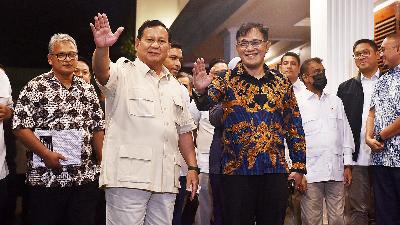
Budiman Sudjatmiko and other 1998 activists are gathering support for Prabowo Subianto-Gibran Rakabuming Raka. They are deemed pragmatic and accused of forgetting history.
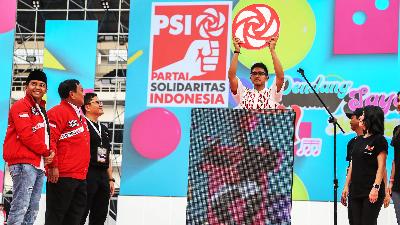
The Jokowi dynasty is supported by the Indonesian Solidarity Party and a number of activists from 1998. Why do they change direction?
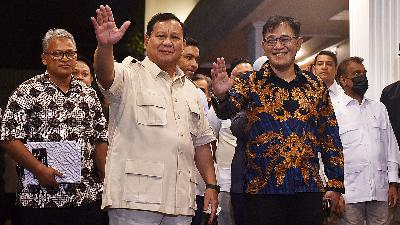
A number of 1998 activists stand behind Prabowo Subianto. Budiman Sudjatmiko is criticized by his colleagues for forgetting history.

Tempo’s Film Selection of 2023 created seven categories for the selected films.

Stock market enjoyed a bull run in 2023. Investors bet on a frayed assumption: six times rates cut in 2024.
Independent journalism needs public support. By subscribing to Tempo, you will contribute to our ongoing efforts to produce accurate, in-depth and reliable information. We believe that you and everyone else can make all the right decisions if you receive correct and complete information. For this reason, since its establishment on March 6, 1971, Tempo has been and will always be committed to hard-hitting investigative journalism. For the public and the Republic.